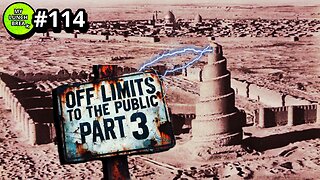Premium Only Content

Above the Law: Bank of International Settlements have Sovereign Immunity
🚨REMINDER: THE U.S. DEPARTMENT OF DEFENSE HAS SPENT **$20 TRILLION** OF U.S. TAXPAYER MONEY THAT IS UNDOCUMENTED AND UNACCOUNTED FOR. Investment banker and former HUD official Catherine Austin Fitts | In this clip from a recent episode of the Children's Health Defense series, Financial Rebellion, Investment banker and former HUD official Catherine Austin Fitts describes how the U.S. Department of Defense (DOD) has spent $20 trillion of taxpayer money (between 1998 and 2015) that has gone undocumented and unaccounted for. Fitts also highlights the fact that the U.S. Department of Housing and Urban Development (HUD) has done the same with $1 trillion of taxpayer money.
Fitts starts out her overview of "the missing money" by noting that in 1994 the New York Federal Reserve Bank and the Federal Reserve (the Fed) bought shares in the Bank of International Settlements (BIS). The investment banker notes that the Bank of International Settlements "is the central bank of central banks in Switzerland and operates above the law...[as] they have sovereign immunity and enjoy it in many respects and they can receive and hold money secretly [and] can keep money on their balance sheets secretly."
Effectively, Fitts says, the U.S. government buying those shares "made their relationship with the BIS much closer..."
The investment banker goes on to note that in October 1995 a budget deal in U.S. Congress "basically crashed and burned" and "it was then that...the president of one of the largest pension funds said to [her], 'They'—whoever 'They' is—have given up on the country and are moving all the money out starting in the Fall." Fitts says it was that Fall, October 1997, "when money started to go missing from HUD, as well as the Department of Defense."
As of today, Fitts says, "there's...$20 trillion between 1998 and 2015 missing from DOD and $1 trillion missing from HUD."
"The other thing that started to happen when that money started to go missing...was what I call the Great Poisoning..." Fitts adds. "Literally, it was the next month after the budget deal crashed that OxyContin was approved and the HUD predatory lending started and the pill mill started and really, the targeting of the low-income neighborhoods started, including the roundups coming from the private prison movement."
"Undocumentable adjustments then skyrocket[ed]," Fitts adds.
Cut to 2001, and "the day before 9/11 Donald Rumsfeld gave a press conference at the Department of Defense...[announcing] that the Department of Defense was missing $2.3 trillion..."
Fitts was told that one of the offices at the Pentagon that was blown up was the location for the office of Naval Intelligence Research Group, which was investigating the missing money.
"The rest is history," Fitts says. "The Patriot Act had passed, and then the DOD got huge appropriations and nobody really cared about the missing money."
Then, in 2015, the DOD financials came out and "it was the greatest missing money in one year [ever]. The DOD was missing $6.5 trillion in a year..."
At that point, Fitts says, Dr. Mark Skidmore, who was a professor and expert in budgeting at Michigan State University, thought she "must be wrong" because "the Department of Defense can't be missing 10-plus times its total budget in a year." Lo and behold, when he investigated the DOD's financials, he found that "actually, [she] was right."
Fitts subsequently asked that Skidmore have his students do a complete survey "of all the financial statements in all the years from fiscal 1997 to 2015."
He and his students got the total missing money to $21 trillion. They subsequently published a report in 2017, at which point Skidmore and Fitts discovered that "the amount of money missing from the U.S. Treasury was the same amount as the total debt of the United States."
Cut to 2018, and Fitts notes that during the theatrical hearings held during the appointment of Brett Kavanaugh to the U.S. Supreme Court, Congress—including both the Senate and the House, Republicans and Democrats—along with the Trump White House "got together and issued a policy called Federal Accounting Standards Advisory Board Statement 56." (Fitts refers to it as FASAB 56 or, phonetically speaking, 'Faz-B 56.')
"[W]hat FASAB 56 says, very short and simple, is basically the government can keep secret books as a matter of administrative policy, thus refusing to obey all the financial management rules and regulations and laws, including the constitutional provisions for disclosure of financial operations," Fitts says. She adds that "they extended it, along with the classification laws, to private companies and banks doing business with the federal government, which means when you look at the U.S. securities market, the large cap section of the U.S. market...most of the disclosure is meaningless. You have no idea how the money works at many of these companies and the government because they're so intertwined."
Interestingly, the investment banker adds that "the COVID-19 operation could never have happened without that [FASAB 56], because it put the Department of Defense, and [other federal government] agencies in a position to, essentially, access an unlimited amount of secret money."
Fitts says somebody once told her that FASAB 56 is "a wet dream" as it allows for "secret money for secret operations."
"I think it was one month after FASAB 56 passed that suddenly Moderna magically raised $500 million. Quite a coincidence," Fitts adds.
-
 1:03:41
1:03:41
Man in America
17 hours agoAre Trump & Musk the COUNTER-ELITES? w/ Derrick Broze
84.3K44 -
 3:45:08
3:45:08
DLDAfterDark
8 hours ago $10.77 earnedDLD Live! SHTF Handguns! Which Would You Choose?
46K2 -
 1:50:38
1:50:38
Mally_Mouse
11 hours agoSaturday Shenanigans!! - Let's Play: Mario Party Jamboree
55.8K -
 1:13:00
1:13:00
Patriots With Grit
15 hours agoWill Americans Rise Up? | Jeff Calhoun
46.2K13 -
 14:55
14:55
Exploring With Nug
15 hours ago $11.56 earnedWe Found Semi Truck Containers While Searching for Missing Man!
62K9 -
 27:57
27:57
MYLUNCHBREAK CHANNEL PAGE
23 hours agoOff Limits to the Public - Pt 3
142K68 -
 38:07
38:07
Michael Franzese
16 hours agoLeaving Organized Crime and Uncovering Mob in Politics: Tudor Dixon and Michael Franzese
111K15 -
 2:42:54
2:42:54
Jewels Jones Live ®
2 days agoAMERICA IS BACK | A Political Rendezvous - Ep. 111
86.9K50 -
 8:47:33
8:47:33
Due Dissidence
1 day agoLIVE: Workers Strike Back Conference ft. Chris Hedges, Jill Stein, Kshama Sawant, and More!
123K92 -
 8:36:37
8:36:37
Right Side Broadcasting Network
5 days agoLIVE REPLAY: CPAC 2025 Day Three with President Donald J. Trump - 2/22/25
471K104